

Dietrich Bonhoeffer, Pastor and Theologian. Bonhoeffer was born in 1906, son of a professor of psychiatry and neurology at the University of Berlin.
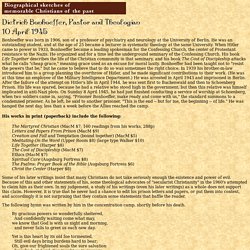
He was an outstanding student, and at the age of 25 became a lecturer in systematic theology at the same University. When Hitler came to power in 1933, Bonhoeffer became a leading spokesman for the Confessing Church, the center of Protestant resistance to the Nazis. He organized and for a time led the underground seminary of the Confessing Church. His book Life Together describes the life of the Christian community in that seminary, and his book The Cost of Discipleship attacks what he calls "cheap grace," meaning grace used as an excuse for moral laxity. Bonhoeffer had been taught not to "resist the powers that be," but he came to believe that to do so was sometimes the right choice. His works in print (paperback) include the following: Some of his later writings insist that many Christians do not take seriously enough the existence and power of evil. PRAYER (traditional language): Highlighted Tings. Contest Rule Book.
Dietrich Bonhoeffer. Dietrich Bonhoeffer, The Man and His Mission Since his death in 1945, and especially in the last ten years, Bonhoeffer's writings have been stirring remarkable interest among Christians, old and young alike.
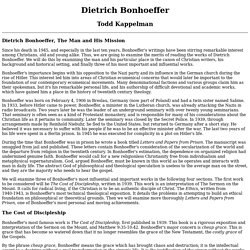
Thus, we are going to examine the merits of reading the works of Dietrich Bonhoeffer. We will do this by examining the man and his particular place in the canon of Christian writers, his background and historical setting, and finally three of his most important and influential works. Bonhoeffer's importance begins with his opposition to the Nazi party and its influence in the German church during the rise of Hitler.
This interest led him into areas of Christian ecumenical concerns that would later be important to the foundation of our contemporary ecumenical movements. Bonhoeffer was born on February 4, 1906 in Breslau, Germany (now part of Poland) and had a twin sister named Sabine. During the time that Bonhoeffer was in prison he wrote a book titled Letters and Papers from Prison. Bonhoeffer, Dietrich. For Bonhoeffer, the foundation of ethical behaviour lay in how the reality of the world and the reality of God were reconciled in the reality of Christ.
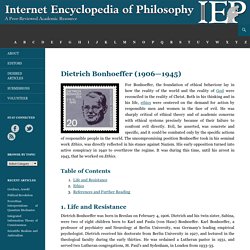
Both in his thinking and in his life, ethics were centered on the demand for action by responsible men and women in the face of evil. He was sharply critical of ethical theory and of academic concerns with ethical systems precisely because of their failure to confront evil directly. Evil, he asserted, was concrete and specific, and it could be combated only by the specific actions of responsible people in the world. The uncompromising position Bonhoeffer took in his seminal work Ethics, was directly reflected in his stance against Nazism. His early opposition turned into active conspiracy in 1940 to overthrow the regime. Table of Contents. Official Dietrich Bonhoeffer International. Dietrich Bonhoeffer. Dietrich Bonhoeffer (4. helmikuuta 1906, Breslau – 9. huhtikuuta 1945 Flossenbürgin keskitysleiri) oli saksalainen evankelis-luterilainen pappi ja teologi sekä natseja vastustavan Tunnustuskirkon perustajajäsen ja sekä vastarintataistelija.
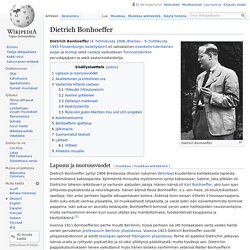
Lapsuus ja nuoruusvuodet[muokkaa | muokkaa wikitekstiä] Dietrich Bonhoeffer syntyi 1906 Breslaussa (Puolan nykyinen Wrocław) kuudentena kahdeksasta lapsesta ensimmäisenä kaksosparista. Kymmentä minuuttia myöhemmin syntyi kaksossisar, Sabine, joka pitkään oli Dietrichin läheisin leikkitoveri ja varhaisin ajatusten jakaja. Hänen isänsä oli Karl Bonhoeffer, yksi tuon ajan johtavista psykiatreista ja neurologeista. Hänen äitinsä Paula Bonhoeffer, o.s. von Hase, oli koulutukseltaan opettaja; hän antoi perheen lapsille alkuopetuksen kotona. Vuonna 1911 Bonhoefferien perhe muutti Berliiniin, missä perheen isä otti hoitaakseen varta vasten häntä varten perustetun professuurin Berliinin yliopistossa. Vastarinta Hitleriä vastaan[muokkaa | muokkaa wikitekstiä]
Image result for dietrich bonhoeffe. Dietrich Bonhoeffer. Dietrich Bonhoeffer Biography -Biography Online. Dietrich Bonhoeffer (Feb. 4, 1906 – April, 9. 1945) was a Protestant Lutheran Pastor, theologian, and active in the German resistance to the policies of Hitler and Nazism.
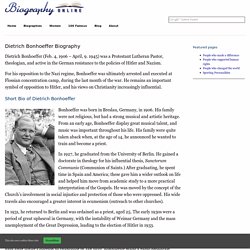
For his opposition to the Nazi regime, Bonhoeffer was ultimately arrested and executed at Flossian concentration camp, during the last month of the war. He remains an important symbol of opposition to Hitler, and his views on Christianity increasingly influential. Short Bio of Dietrich Bonhoeffer Bonhoeffer was born in Breslau, Germany, in 1906. His family were not religious, but had a strong musical and artistic heritage.